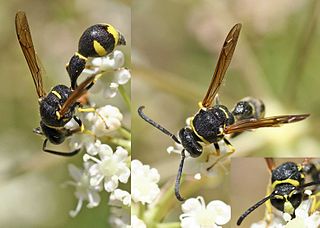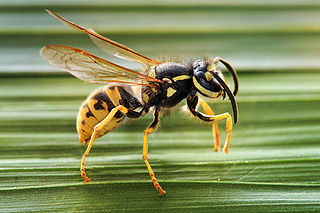
Potter wasps, the Eumeninae, are a cosmopolitan wasp group presently treated as a subfamily of Vespidae, but sometimes recognized in the past as a separate family, Eumenidae.

Eumenes is the type genus of the subfamily Eumeninae of Vespidae. It is a large and widespread genus, with over 100 taxa, mostly occurring in the temperate portions of the Northern Hemisphere. Most species are black or brown, and commonly marked with strikingly contrasting patterns of yellow, white, orange, or red. Like most vespids, their wings are folded longitudinally at rest. The first metasomal segment is narrow and elongated, creating a "bulbous" appearance to the abdomen.
Alphamenes is a small neotropical genus of potter wasps currently containing 7 species, it was named by the Dutch entomologist Jacobus van der Vecht in 1977.
Omicron is a quite diverse Neotropical genus of small potter wasps.
Sphaeromenes is a small Neotropical genus of potter wasps.

Ropalidia is a large genus of eusocial paper wasps in the tribe Ropalidiini distributed throughout the Afrotropical, Indomalayan and Australasian biogeographical regions. The genus Ropalidia is unique because it contains both independent and swarm-founding species. Ropalidia romandi is one of the swarm founding species, meaning that new nests are founded by a large group of workers with a smaller number of inseminated females, while Ropalidia revolutionalis is independent-founding, meaning that each nest is founded by a single queen.
Stenodyneriellus is an Australasian and Indomalayan genus of potter wasps.
Knemodynerus is a genus of potter wasps distributed through the Palearctic, Afrotropical, Indomalayan and Australasian regions. The species currently classified in the genus are:
Kennetia is a small Indomalayan genus of potter wasps. It should be spelled Kennethia but Antonio Giordani Soika misspelled the name in his original description of the genus.
Lissodynerus is an Indomalayan and Australasian genus of potter wasps. The following species are classified under Lissodynerus:
Stroudia is an Afrotropical genus of potter wasps.

Polybia is a genus of eusocial wasps ranging from Central to South America. Some produce enough honey to be collected and eaten by local people.
Eustenancistrocerus is an Afrotropical, Palearctic and Oriental genus of potter wasps. The species in this genus include:
Paravespa is an Afrotropical and Palearctic genus of potter wasps.
Pseudonortonia is a fairly large genus of potter wasps with a rich Afrotropical fauna, as well as with several species which occur throughout the Palearctic and Indomalayan regions.

Delta emarginatum is a species of potter wasp in the subfamily Eumeninae of the family Vespidae.
Antonio Giordani Soika was an Italian entomologist, ecologist and director of the Civic Museum of Natural History of Venice. He had a long career in which he worked on various groups of insects but much of his work was on the Hymenoptera. He made great contributions to the knowledge of Neotropical wasps, especially potter wasps for which he produced many taxonomic keys and also monographs on the systematics of the wasp family Vespidae.
Afreumenes violaceus is a species of wasp in the Vespidae family. It was described by Giordani Soika in 1941.
Alphamenes convexus is a species of wasp in the Vespidae family. It was described by Fox in 1899.
Alphamenes richardsi is a species of wasp in the Vespidae family. It was described by Soika in 1978.






